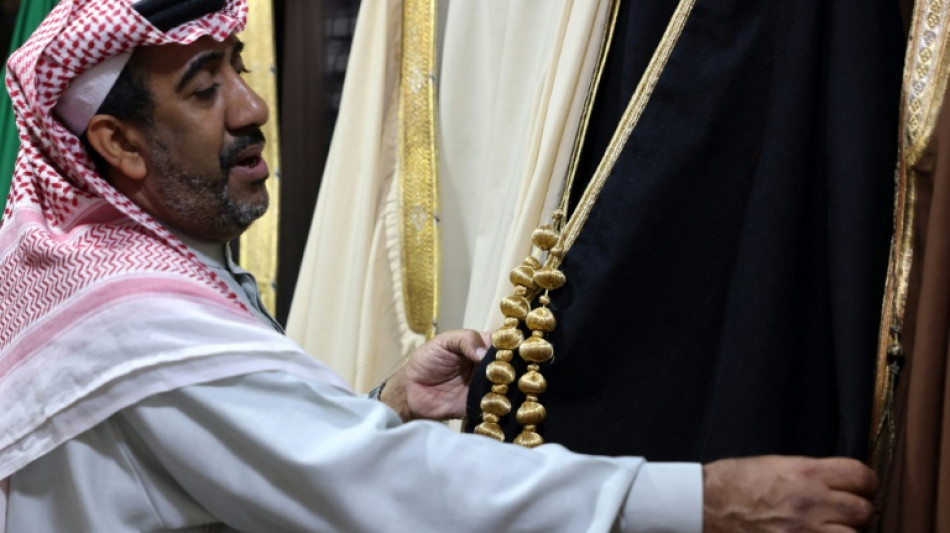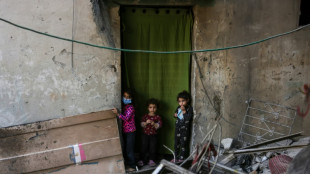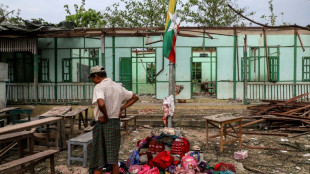
-
 Gaza rescuers say 80 killed in Israeli strikes amid hostage release talks
Gaza rescuers say 80 killed in Israeli strikes amid hostage release talks
-
Ancient reptile tracks rewrite when animals conquered land

-
 Turkey eyes legal steps after Kurdish militant group PKK disbands
Turkey eyes legal steps after Kurdish militant group PKK disbands
-
Alcaraz sweeps past Draper and into Italian Open semis

-
 Europe Ryder Cup captain Donald has given players no assurances
Europe Ryder Cup captain Donald has given players no assurances
-
Trump drug price plan could nix investment, warns Roche

-
 Tom Cruise unleashes 'Mission: Impossible' at Cannes
Tom Cruise unleashes 'Mission: Impossible' at Cannes
-
Trump admin weakens limits on 'forever chemicals' in drinking water

-
 Paris to allow swimming in Seine from July in Olympic legacy
Paris to allow swimming in Seine from July in Olympic legacy
-
Germany's Merz urges Europe-US unity on Ukraine war

-
 Tom Cruise nearly met his end on 'The Final Reckoning'
Tom Cruise nearly met his end on 'The Final Reckoning'
-
No new burdens for McIlroy, living the dream after career Slam

-
 Sean Combs's ex Cassie to face defense grilling at second day in court
Sean Combs's ex Cassie to face defense grilling at second day in court
-
Ageless beauty contest: South African grannies strut the catwalk

-
 Trump says 'possibility' of meeting Putin for Ukraine talks in Turkey
Trump says 'possibility' of meeting Putin for Ukraine talks in Turkey
-
Gauff sees off Andreeva to reach Italian Open semis

-
 Merz vows to rev up German economic 'growth engine'
Merz vows to rev up German economic 'growth engine'
-
Strikes kill 29 in Gaza, amid hostage release talks

-
 Tennis champ Sinner meets Pope Leo, offers quick rally
Tennis champ Sinner meets Pope Leo, offers quick rally
-
England sees driest spring since 1956: government agency

-
 Trump presses Syria leader on Israel ties after lifting sanctions
Trump presses Syria leader on Israel ties after lifting sanctions
-
Rare blue diamond fetches $21.5 mn at auction in Geneva

-
 Stock markets fluctuate as China-US trade euphoria fades
Stock markets fluctuate as China-US trade euphoria fades
-
Ousted Myanmar envoy charged with trespass in London residence row

-
 Russia jails prominent vote monitor for five years
Russia jails prominent vote monitor for five years
-
Umbro owner in joint bid for Le Coq Sportif

-
 Tom Cruise has world guessing as he unleashes 'Mission: Impossible' at Cannes
Tom Cruise has world guessing as he unleashes 'Mission: Impossible' at Cannes
-
China's Tencent posts forecast-beating Q1 revenue on gaming growth

-
 Trump presses Syria leader on Israel relations after lifting sanctions
Trump presses Syria leader on Israel relations after lifting sanctions
-
FA appoint former Man Utd sporting director Dan Ashworth as chief football officer

-
 Stop holding opponents incommunicado, UN experts tell Venezuela
Stop holding opponents incommunicado, UN experts tell Venezuela
-
Indonesian filmmakers aim to impress at Cannes

-
 Trump presses Syria leader on Israel after lifting sanctions
Trump presses Syria leader on Israel after lifting sanctions
-
French PM to testify on child abuse scandal

-
 Players stuck in middle with IPL, national teams on collision course
Players stuck in middle with IPL, national teams on collision course
-
Peru PM quits ahead of no-confidence vote

-
 Strikes kill 29 in Gaza as hostage release talks ongoing
Strikes kill 29 in Gaza as hostage release talks ongoing
-
Court raps Brussels for lack of transparency on von der Leyen vaccine texts

-
 France summons cryptocurrency businesses after kidnappings
France summons cryptocurrency businesses after kidnappings
-
Pakistan returns Indian border guard captured after Kashmir attack

-
 Baidu plans self-driving taxi tests in Europe this year
Baidu plans self-driving taxi tests in Europe this year
-
Trump meets new Syria leader after lifting sanctions

-
 Equity markets swing as China-US trade euphoria fades
Equity markets swing as China-US trade euphoria fades
-
Burberry warns 1,700 jobs at risk after annual loss

-
 Trump to meet new Syrian leader after offering sanctions relief
Trump to meet new Syrian leader after offering sanctions relief
-
'Children are innocent': Myanmar families in grief after school air strike

-
 Colombia joins Belt and Road initiative as China courts Latin America
Colombia joins Belt and Road initiative as China courts Latin America
-
Australian champion cyclist Dennis gets suspended sentence after wife's road death

-
 Protection racket? Asian semiconductor giants fear looming tariffs
Protection racket? Asian semiconductor giants fear looming tariffs
-
S. Korea Starbucks in a froth over presidential candidates names

| RBGPF | 1.27% | 63.81 | $ | |
| CMSC | -0.5% | 21.95 | $ | |
| RIO | -0.19% | 62.15 | $ | |
| GSK | -0.25% | 36.26 | $ | |
| RYCEF | -0.19% | 10.68 | $ | |
| CMSD | -0.09% | 22.37 | $ | |
| NGG | 0.25% | 67.7 | $ | |
| SCS | -1.32% | 10.57 | $ | |
| AZN | -1.77% | 66.54 | $ | |
| RELX | 1.29% | 53.085 | $ | |
| BCC | -1.51% | 92.32 | $ | |
| JRI | -0.78% | 12.78 | $ | |
| BCE | -3.07% | 21.325 | $ | |
| VOD | -0.22% | 9.04 | $ | |
| BP | -0.48% | 30.415 | $ | |
| BTI | -0.58% | 40.455 | $ |

'My entire life': Saudi tailor keeps robe-making craft alive
Saudi tailor Habib Mohammed's shop once made ornate, hand-woven cloaks for royals, a time-honoured craft he is determined to preserve even as mass-produced garments flood the market, threatening his traditional business.
He makes "bisht", a long gown which for centuries has been a status symbol, worn by kings and princes -- and ordinary men -- and could take a week of meticulous work to create.
Now, with cheap Chinese-made robes taking a bite out of his business, the 60-year-old tailor is struggling to make a profit, and his only son wouldn't take over the beleaguered shop.
But Mohammed refuses to let the ancient craft die, searching for ways to hand down his knowledge.
"We've started training here at the shop and at home," he told AFP in his windowless atelier in the oasis city of Hofuf, with bishts hanging all around.
"I am teaching my grandchildren, be they girls or boys."
In Mohammed's native Al-Ahsa governorate, it was "considered shameful for a man to go to a funeral or a market, or make a visit to anyone anywhere without wearing the bisht", he said.
The bisht came to global attention in 2022 when Qatar's emir draped one over football star Lionel Messi after the World Cup final.
Although Arabs across the Gulf still sometimes wear traditional garb, especially in formal settings, factory-made clothing has replaced tailor services in the oil-rich countries of the region.
- Robe 'recession' -
At his workshop, Mohammed watched over his granddaughter Fajr, nine, and grandson Ghassan, 10, as they embroidered delicate gowns.
For the veteran craftsman, who learned to weave when he was only five, this is "my entire life".
"I came into this world... seeing only bishts around me," said Mohammed, wearing the Saudi national dress of white thobe robe and chequered red-and-white headdress.
"I was born in (my father's) tailor shop and grew up watching my mother sew. I saw my brothers and cousins work with my father in the tailor shop," he added with pride.
His wife was also a bisht seamstress, he said, skilled at collar embroidery.
But his modest shop in an artisans' market in Hofuf has fallen on hard times.
"A sort of recession has taken hold," he said.
A high-quality bisht could once have fetched up to 6,000 riyals ($1,600), but machine-made cloaks sell for just a fraction of that price, Mohammed said.
"Pieces I would make for 1,500 riyals now go for 150 riyals. It's not enough to make a living."
- 'Didn't give up' -
Mohammed refuses to let the tradition die out, and he is far from alone.
A bisht revival is taking shape in Saudi Arabia even as it opens up to the world, attracting tourists and foreign businesses.
Last year, the kingdom ordered ministers and other senior officials to wear a bisht when entering or leaving the workplace or attending formal events.
Saudi Arabia has named 2025 the Year of Handicrafts, when it will promote and support 10 crafts including bisht-weaving.
And Gulf countries are trying to include the bisht on the UNESCO list of intangible cultural heritage in a bid to preserve the craft.
Some of the bishts hanging on the walls of Mohammed's workshop are at least a century old, he said, proudly presenting a brown robe made from sheep's wool.
"Someone offered me 200,000 riyals for this, but I refused to sell it because it is as dear to me as my life. It represents my country's history," he said.
"I want to pass them down to my children and grandchildren, and I will instruct them never to sell them," he said, pointing to the pieces on the walls.
Mohammed also gives weekly bisht tailoring lessons at a nearby institute, mostly for young people.
"We didn't give up," he said, training the younger generation "to revive an old heritage that was disappearing".
"We will bring it to life once more," said Mohammed.
T.Ward--AMWN